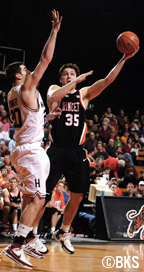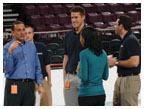
|
March 5, 2008: Sports
Anaheim’s affable bruiser
Parros ’03 fills the unlikely role of NHL enforcer
Ups and downs
Men’s basketball opens 2–3 in Ivy
March madness: Room for three?
Sports Scores — Updated weekly
MORE SPORTS ON THE BLOG, click here.
Anaheim’s
affable bruiser
Parros ’03 fills the unlikely role of NHL enforcer
By Jay Greenberg
Princeton has produced multiple Nobel Prize, National Medal of Science, and Pulitzer Prize winners. It never had a Stanley Cup winner, however, until George Parros ’03.
“I’m pretty proud of that,” said Parros, a right wing for the Anaheim Ducks, last season’s NHL champions, and holder of what might be the Class of 2003’s most unusual occupation, a highly visible position in ... uh ... security.
Parros is an enforcer, in hockey parlance, called on to fight opponents’ tough guys to discourage them from harassing his own team’s more skilled players. Princeton didn’t exactly prepare him for this line of work — fisticuffs are forbidden in college hockey — and the job contrasts with the stereotype of an Ivy Leaguer.
“I know, I should be in a blue blazer and ascot,” Parros said, smiling. “Maybe a cardigan.”
Nevertheless, when people drop their jaws at his educational background, he does not drop the gloves. Not even if they wonder why he isn’t in law school. “I’m living a dream, have no shame,” Parros said. “I was going to try hockey first and worry about the real world later. I didn’t want to have any regrets.”
Today, most of the regrets belong to the hulking, snarling counterparts who challenge Parros on the ice. Hockey enforcers typically reach the pros by fighting their way through junior hockey leagues in Canada. Parros was a teddy bear by comparison, with a background that includes youth hockey in Washington, Pa., Columbus, Ohio, and Randolph, N.J. But in the last few seasons, he has become one of the NHL’s most feared brawlers.
Drafted in the eighth round by the Los Angeles Kings in 1999, almost entirely because of his 6-foot, 5-inch frame, Parros attended the Kings’ summer development camps, where his aggressive nature in the corners and the front of the net would lead to occasional fights.
“I had only two [fights] in junior hockey and didn’t know what I was doing,” he said. “I pretty much just fell over, had terrible balance.”
Parros figured it would be better to learn to defend himself against the kids in the development camps rather than against the pros. And when he began to win more scraps than he lost, he came to understand that fighting could be the ticket to the NHL for a player who scored only 20 goals in his four years at Princeton. Ryan Flinn, a tough guy also trying to make the Kings, provided some tips. But mostly Parros learned through his experiences on the ice.
In Orange County, Parros’ engaging personality and bushy mustache have made him hugely popular among fans. And according to Ducks coach Randy Carlyle, diligent practice has helped Parros become a more versatile player. “You can trust him [defensively] when the intensity or importance of the game goes up,” Carlyle said.
Parros joined Anaheim in November 2006 when the Ducks traded a second-round pick to Colorado. (He had previously signed with the Avalanche after being waived by the Kings.) “It was tough getting here, not fun moving around, but it’s like the bingo balls were shuffling in the drum and I ended up in the right spot,” he said. “I feel like I have found a home.”
Meanwhile, he has not forgotten his old one. Every Stanley Cup winner gets a summer day with the most fabled trophy in North American sports, and Parros spent part of his at Baker Rink, making Hobey proud, to paraphrase the banner that hangs from the rink’s balcony.
“To have a Cup winner is important to the program and I had great
years at Princeton,” he said. “I had to take it back and share
it.” ![]()
Jay Greenberg is a New York Post sports columnist and an occasional contributor to PAW.

(Beverly Schaefer) |
Ups
and downs
Men’s basketball opens 2–3 in Ivy
When Noah Savage ’08 was a freshman, he started every game in the men’s basketball team’s nonleague schedule, helping the Tigers beat Rutgers at home, win a double-overtime game at Davidson, and hang tough against Duke in a loss at Cameron Indoor Stadium. So when Princeton opened its Ivy League slate against Brown that season, he figured he was more than ready. “I remember Scott Greenman [’06] saying, ‘You have no idea how hard the league is,’” Savage said. “I believed him, but until you go through it, you don’t know.”
With Ivy games on back-to-back nights each weekend, teams have little time to regroup — confidence can surge after a big Friday-night win or quickly vanish with a loss. Princeton saw both sides of the coin in February, sweeping Dartmouth and Harvard Feb. 1 and 2 before losing on the road at Cornell and Columbia Feb. 8 and 9. The Tigers also lost a Tuesday-night game at Penn Feb. 12.
In the first Ivy weekend, the Tigers relied on solid defense and timely shooting, holding on to a slim lead down the stretch to top Dartmouth, 57–53, and exploding in the second half to comfortably handle Harvard, 68–54. It was a welcome change for a team that had lost 12 consecutive games in November, December, and early January.
Against Cornell, the Ivy frontrunner, Princeton continued its strong play, chipping away at the Big Red’s early lead and closing to within a basket midway through the second half. But Cornell replied with an 8-0 run and held on to win, 72–61.
The following night at Columbia, the Tigers led for much of the second half before cold shooting and turnovers allowed the Lions to jump ahead. Columbia won, 58–53. “They made some big hustle plays and did some nice things at important times,” Lincoln Gunn ’10 said afterward. “It’s frustrating. We didn’t make the same kind of plays late in the game.”
Losing to Penn might have been even more frustrating. In the final 30
seconds, the Tigers had two opportunities to take the lead or tie the
game. On the first, trailing by one, Savage missed an open 3-pointer.
Seconds later, down three, Princeton never had a chance to pass the ball
inbounds. Officials called a technical foul on Savage as he pushed for
postion with a Penn player at midcourt, giving the Quakers two shots,
possession, and an eventual 70–65 win. ![]()
By B.T.

March madness: Room for three?
(Courtesy Rick Giles ’83) |
Rick Giles ’83’s company, the Gazelle Group, has carved a niche in the sports marketing world as the operator of some of college basketball’s top preseason tournaments. This year, Giles is hoping to carry that experience into March with a new postseason tournament called the College Basketball Invitational.
The CBI, scheduled to tip off March 18, will feature 16 teams in a single-elimination format for the first three rounds. The two teams that reach the championship will play a best-of-three series, alternating home courts.
With 65 teams competing in the NCAA Tournament and another 32 playing
in the NIT, are there enough good teams remaining to support a third event?
Giles thinks so. He tested his idea last year by drawing a mock bracket
of 16 teams that were not invited to the NCAA Tournament or the NIT. The
group included traditional powers with winning records — Connecticut,
LSU, and Oklahoma, for example. And when Giles asked their coaches if
they would have played in a postseason invitational, the responses were
promising: “Fifteen out of 16 said yes without hesitation,”
he said. ![]()
By B.T.
Rick Giles ’83, left, plans to launch a new tournament in March to compete with the NIT.

MEN’S SQUASH topped Harvard 9–0 Feb. 10 to win the Ivy League championship and complete a season sweep of its Ivy opponents. The Tigers won all 54 of their individual matches in league competition. As a team, Princeton lost once in the regular season, 6–3 at top-ranked Trinity Jan. 30. WOMEN’S SQUASH was 5–1 in Ivy play, losing a 5–4 match Jan. 30 at Penn, the eventual league champion.
With wins over Brown Feb. 8 and Yale Feb. 9, MEN’S HOCKEY continued to climb in the ECAC Hockey standings. The Tigers entered a second-place tie with Quinnipiac, one win behind Clarkson. WOMEN’S HOCKEY won five consecutive games before tying Brown, 2–2, on the road Feb. 9.
WOMEN’S SWIMMING dominated Harvard and Yale at
a record-setting H-Y-P meet Feb. 2 and 3 in New Haven. Meredith Monroe
’11 set a new Princeton best in the 200-yard backstroke (1:57.53),
while Alicia Aemisegger ’10 broke school records in the 1,000-yard
freestyle (9:36.91) and the 200-yard butterfly (1:55.31).
![]()


